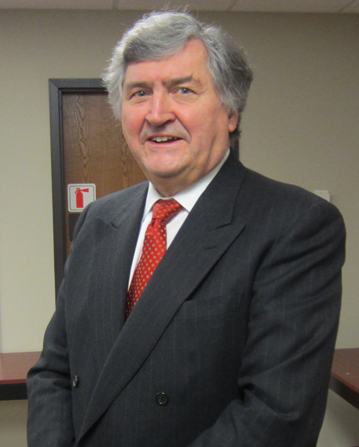Expert Talks of Worldwide Persecution of Christians

Islamic terrorism in the Middle East is the greatest threat to the persecution of Christians across the globe, said Paul Marshall on Monday at the Calvin College January Series 2015.
“Islamic persecution is widespread and it is growing, especially in Syria and Iraq,” said Marshall, a senior fellow at the Hudson Institute’s Center for Religious Freedom in Washington D.C.
Christians are being killed or forced to flee in these countries, as well as in such countries as Nigeria and Somolia, he said.
But Islamic persecution of Christians is only one of three patterns of persecution that is occurring worldwide, said Marshall, author and editor of more than 20 books on religion and politics, especially religious freedom, including Persecuted: The Global Assault on Christians (2013, with Lela Gilbert and Nina Shea).
In one pattern of persecution, Marshall said, he sees persecution occurring in communist countries such as China, Vietnam, Laos, Cuba and North Korea, with North Korea being the worst.
Persecution in China particularly targets the Catholic Church. “The churches are being repressed for recognizing the authority of the pope,” he said. “Priests and bishops have been arrested and churches have been razed.”
Unregistered house churches in China have also faced persecution. Last year, a Catholic church in Vietnam was destroyed.
Persecution of Christians is also occurring in such central Asian countries as the former Soviet republic of Turkmenistan, said Marshall, where foreigners suspected of religious activity are expelled. The publication of religious literature inside the country is banned. No unregistered religious groups or communities are allowed, and religious communities have been unable to register for years.
A second pattern, Marshall said, has to do with conflicts arising out of religious nationalism in such countries as India where some Hindus and Buddhists are at odds with Christians. In one state in India alone, there are three attacks per week against Christians, said Marshall.
What makes the persecution of Islamic terrorism different is that it is based on an export model that seeks to grow and infiltrate other countries, he said. China, for example, wants to run its own affairs and is not seeking to export its model.
Marshall was asked why some Muslims have this export model.
Although it is difficult to pinpoint why, it may have to do with the mindset of those who are spreading it, said Marshall.
It is possible these people have turned to persecution in reaction to the various disruptions rampant in the modern world.
“People are uprooted and alienated,” Marshall said in a separate presentation in the Grand Rapids office of the Christian Reformed Church. The CRC helped to underwrite his January Series speech.
“People are unemployed, living on the margins and have no hope,” he said.
“Often, jihadists are not at home in the mosque. Rather, there is the power of a gang mentality. You follow your group, but you are not very pious.”
There are likely other reasons as well.
In all, persecution is growing and is taking place in more than 35 countries, he said.
But one place where there seems to be a level of harmony among religions is Indonesia, the most populous Muslim nation in the world.
“I can report good news about Indonesia,” he told the group at the CRC office. “This is where I will be doing more work and looking at why is the world’s largest Muslim country so tolerant.”
Although the news is not so good in other countries, Marshall says there are things people can do, and chief among them is to become aware of the circumstances in various places and pray about them.
Donating to Christian groups working overseas, especially among those suffering from persecution, is helpful. “We should work together with others on the issues, form alliances,” said Marshall.
Finding ways to support legal services for Christians being imprisoned, drawing attention to these cases through the media, and seeking the backing of the U.S. and Canadian governments to end persecution wherever possible are important.
Above all, Marshall said, it is crucial for Christians to be clear on what should motivate them in being willing to act.
“Religious persecution is an evil that is not going to end in the near future, but it must be fought,” he said. “Christians and others will do better to the degree we can make their lives better.”
It is important to realize, said Marshall, that “we are all part of one body. Remember that Christ said whatever we do to ‘the least of these’ we do unto him.”


